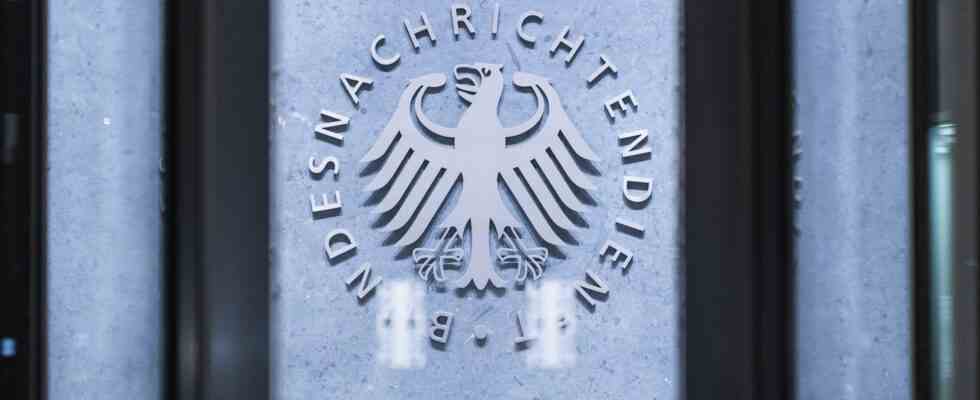Status: 01/12/2023 2:31 p.m
A senior BND employee is said to have spied for Russia. The case raises the question of how safe the security authorities actually are – and how secrets can be better protected.
The position in which Carsten L. sat is highly sensitive. His department in the Federal Intelligence Service (BND), Technical Reconnaissance, monitors telephone calls, radio messages and Internet communication worldwide. The war in Ukraine, the crises in the Middle East and Africa, the Iranian nuclear program – what L. and his team listen to and read is often explosive. About half of the daily BND reports come from her department. The findings are considered the crown jewels of the service.
It is such information that Carsten L. is said to have disclosed to a Russian secret service. The Federal Public Prosecutor therefore accuses the BND man of treason and had him arrested shortly before Christmas. While the Federal Criminal Police Office (BKA) is now investigating the course of the alleged treason, the Federal Intelligence Service (BND) is dealing with the equally important questions: How did it come to this? Was there any earlier evidence of a “mole”? And how can the country’s secrets be better protected?
Routine test passed
The security checks of the BND staff play a role – even if in the case of L. according to information from WDR and NDR initially apparently no violations were found. The former Bundeswehr colonel, who has been with the BND for around twelve years, was routinely checked and there was nothing to complain about.
The last known case of an inside perpetrator at the BND was years ago. After Markus R.’s arrest in 2014, it emerged that he had sold more than 200 secret documents to the CIA. He had copied some of the papers in the office and simply carried them home. R. was probably never checked when leaving the building. After the fall, the BND is said to have sharpened the rules. How exactly? That’s a secret.
High security requirements in everyday life
High security regulations apply to everyday work at the BND. Anyone who enters a service building must stow their mobile phone in the locker. Different cards regulate access for the security locks at the entrance, for the various building wings and the individual offices. Every access to computer files is logged and can be traced. Bags are randomly checked – so that documents are not smuggled out.
Security authorities such as the BND scrutinize their staff even before they start their careers. A security check (SÜ) is mandatory. The particularly strict Level III applies to the BND, the Office for the Protection of the Constitution and some police authorities. This means that the person is not only queried as in Level I in the databases of the police and intelligence services. It is also not enough, as in stage II, to tap further details from the CV and the immediate private environment. At level III, the authorities take another closer look.
Privacy is strictly checked
Those who apply must name several reference persons who are then asked: Does the person in question drink a lot of alcohol or take drugs? Is she addicted to gambling or heavily in debt? Are affairs known? This is how blackmail potentials are to be determined. The service is also interested in travel destinations or contacts in certain countries. There are currently 26 so-called “risk countries”, including Russia, China, Afghanistan, Iran, Syria and North Korea – but also Cuba, Ukraine, Lebanon and Vietnam. After all, such security reviews are generally repeated every five or ten years.
There are a few statistics on checks by authorities and ministries. Two trends are noticeable: In recent years, the number of examinations has roughly doubled to more than 20,000 per year – which is mainly due to the large number of new hires. The process usually takes many months.
Significantly more abnormalities
The proportion of checks with “security-relevant findings” or with the “identification of a security risk” has roughly quadrupled. According to security circles, this in turn is only partly due to stricter rules. It is said to have something to do with the fact that after various incidents – especially in the Bundeswehr – people simply take a closer look.
Islamist as Islamist Observer?
With all caution – in recent years, the limits of security checks have become clear. Because not all off-duty activities with risk potential are known. For example, there was an employee of the Federal Office for the Protection of the Constitution (BfV) who was supposed to monitor Islamists.
What no one in the authorities suspected: the man himself had converted to Islam and had apparently become radicalized. In an online chat, he boasted that he was an intelligence officer and ranted about a possible attack on the BfV headquarters. He was caught because his chat partner was not a like-minded Islamist, but a secret intelligence colleague.
Increased scrutiny of social media activity
There was a case in the BKA that also caused a lot of discussion within the authority: A secretary of the management is said to have worked as an escort on the side. The authority only found out when the woman was blackmailed by colleagues who had discovered her offer on the Internet. At the Federal Office for Migration and Refugees (BAMF), on the other hand, an employee who had long been classified as a right-wing extremist by the security authorities was involved in the repatriation of asylum seekers.
Such incidents have led to readjustments to security checks. In some cases, people are now looking at the context in which people appear on the Internet, what they write there or with whom they are connected. Such online research is considered to be very time-consuming, but very productive. Publicly visible areas of social networks are no longer taboo. Social media accounts must be provided under certain conditions.
In the business area of the Federal Ministry of Defense, a new test level was even introduced last year – which is also called “SÜ 4”. With particularly strict digital checks and repeat checks every five years instead of ten. It is a reform that could perhaps soon find its way into the BND. In any case, the chancellor’s office, which is responsible for the foreign intelligence service, did not want to comment officially on possible mistakes or reforms.
In the USA, which is also struggling with high check numbers and long procedures, people rely on another instrument: the reliability of police officers and secret service agents is checked using a lie detector. It is less about concrete questions – but about possible abnormalities, which one then pursues further. What is certain, however, is that employees who were later exposed as traitors had previously tricked the lie detector.
In Germany, the lie detector is not yet used; the procedure is considered unscientific by many security experts, the error rate is too high. Many verified would fail – even though they answer truthfully.


